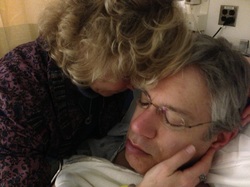How to create a more loving relationship by Gina Lake (published in the Daily Om)
0 Comments
 My love post angiogram 12/18/12 Robin Goldman and I got some discouraging news yesterday with his angiogram and I decided to post a question on the AVM Survivor's Network to tap in to their collective courage and wisdom. The wise response back from "Ron" are words that can benefit all of us..... As Robin and I continue to travel this road, we are so very thankful for the angels that appear in our midst... like my friend, Evelyn who came down to the waiting room yesterday and cried with me as we heard news; or the person I've never met who came over to me and handed me rosary beads..... and my friend Susan M. Hahn who was there with us and will be there on Monday to meet with the doctor.... there are blessings amidst the pain, if we choose to look for them.... And, for Robin and I, as they say..... "it's not over 'til it's over!" Thanks, Ron!......... "Sorry no experience in cortical venous drainage. As far as encouraging words, I've watched my wife go into brain surgery about 10 times (counting embolizations) and my son twice to stop seizures. It is not a fun journey, but for us, everything came out well. I wish the same for you! I would encourage you to cherish every hour of every day. Forget about cleaning the house or doing laundry (hire someone if you can, or just ignore it). As much as you can, go and do things that are fun. If you enjoy reading, read all the encouraging books you can find. Be a joy to those around you, in any way that you can. Give your friends and family that want to help you specific things they can do. They are hurting too, and any tasks they can lift from you helps YOU and THEM as well. Give yourself permission not to hang around negative people (even if they are family). Turn off the news. We joke with our kids that we bought a new tv to watch Gun Smoke in hi def! Laugh everyday, or every hour. I am reminded of a saying I read in one of the Chicken Soup of the Soul books: "If you found out you only had an hour to live, who would you call, what would you say, ............ and what are you waiting for???????????????" Not meaning this as a downer thought, just a call to action. Make a bucket list and start. Not suggesting round the world trips. Heck it might be 'go to dinner and a movie'. I hope this helps and I wish you the best, Ron, KS"  Recently, I've been putting much thought into the impact of "expertise" in healthcare. As a leadership and physician leadership coach, I very often work with my clients on their habit of problem solving, knowing "the" right answer, judgment, and intellect. In my personal journey in dealing with my husband's life-threatening brain disorder, I find myself torn between wanting to look to my physicians for "expertise" and "hope," while also being aware of the limitations of medicine and my need to define my own reality... my own story. It is an interesting perspective to be a consumer of healthcare and practitioner within healthcare at the same time. I've been reading, with avid interest, the differences between the medical model and patient-centered model, as defined within "Escape Fire's" movie and facebook page (that is where all the "expert information" is, right??). As the authors describe, the patient-centered model requires a shift from "physician dominant," to "physician collaborates:" From "care is disease-centered," to "care is quality of life centered;" From "physician does most of the talking" to "physician listens more and talks less." As I read various related literature, like "The Four Habits" that was created by the great folks at Kaiser Permanente, I think about tools that help shift this paradigm. As they describe, The Four Habits are: Invest in the Beginning, Elicit the Patient's Perspective, Demonstrate Empathy, and Invest in the End. The goals of the Four Habits are to establish rapport and build trust rapidly, facilitate the effective exchange of information, demonstrate caring and concern, and increase the likelihood of adherence and positive health outcomes. What I find fascinating about this model is that it parallels the framework of a coaching model perfectly! In coaching, the client is the expert, holding all the wisdom, strength and courage that a capable, wise, and powerful being possesses. A table succinctly describes the four habits and associated skills: "elicit patient concerns;" "ask for the patient's ideas;" "be open to patient's emotions;" and in "investing in the end," "deliver education and diagnostic information and then involve the patient in the decision making process." It reminds me of a dance that is more of an interplay between leader and follower with those roles being flexible and dynamic, rather than fixed and unchanging. All of this requires a perspective that is quite different from doctor, or nurse, or any other discipline as "expert." It requires a vulnerability that allows us to say: "I don't know everything" and most importantly, I don't know what matters most to my patient. Therefore, while my breath and depth of knowledge is vital, I'm also a learner along this journey of wellness with my patient/ client. Now there's a thought! What impact would it make if we were to start labeling the "patient" "client?" Better yet, how about "health partner?" Whatever term would convey the essence of each individual's wisdom and insight to direct their own health, and their own wellness, even if that includes dying. There are two resources I use repeatedly in my work with clients: Marilee Adams' "Change Your Questions, Change Your Life," and David Emerald's "The Power of TED." Ms. Adams describes her simple, yet powerful "Choice Map," which helps the reader consider a shift in perspective from judger to learner. It requires us to recognize when we are making judgments about others (which she describes as landing us in the pits) and intentionally shifting that perspective to one of learning and desired outcomes. It's less about blame and who's right or wrong, and more of "what do we want, what assumptions am I making, and what are the options open to us?" Mr. Emerald describes the empowerment dynamic as moving from victim to creator. As a creator, I have choices in how I deal with life's challenges, and I can seek the help of coaches who can appropriately challenge me to discover my wisdom and help me move toward health and success. Can we make that shift in healthcare? Can we use our great strength in problem solving and science/ medicine, while also making room for art in more fully engaging our health partner on their journey to wellness? Can we notice and abandon our own egos and judgments, in service to the patient? I, for one, would love to be part of that journey! I welcome your perspective! |
AuthorJoy Goldman is an avid photographer, and perpetual seeker of positive and inspiring views. She has spent much of her life, regardless of career expression, in finding what's positive, and using that to serve others. As a lifelong learner, Joy lives the principles she teaches, and challenges herself to be a model for the courage, humility and authenticity she requests of others. Archives
November 2017
Categories
All
|
 RSS Feed
RSS Feed
